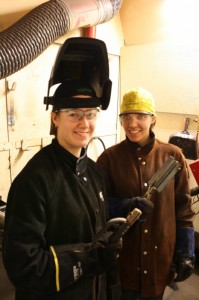A program now being offered at Camosun is reinforcing the need for women in the trades.
The college is now offering a 12-week program designed to introduce women to trades like carpentry, electrical work, and sheet metal fabricating.
The Women in Trades Exploration (WTE) program targets low-skilled individuals and helps them to explore the opportunities available through the trades and decide which one they would like to focus on. Along with practical skills they also learn how to be employable and about options for further training.

Women are underrepresented in skilled trades careers in BC but are becoming more prevalent in the trades industry as time goes on.
“I’ve been a carpenter the last eight years and I’ve slowly started seeing more women,” says Interurban sheet metal and metal fabricating student Kyle Ferguson. “It’s great; there are two in our class and they probably have the highest marks.”
This type of success and skill level seems to be common with the women in this program. WTE just started at Camosun last year, and the first six women who went through are all employed, three of them at Victoria Shipyards. Seaspan Marine, who own Victoria Shipyards, recently won the federal shipbuilding contract, which could mean upwards of 4,000 jobs.
Apart from increasing job opportunities, another reason for interest in WTE is because the program covers a variety of areas, including carpentry, electrical, plumbing, and blueprinting.
“The WTE program is designed for women, and it’s designed for individuals who have had little or no exposure at all to trades,” says WTE program director Karen McNeill. “It’s about two days in each trade; we try and do a project in each one of the trades. Last week they were framing in the backyard, drywalling, and painting.”
There are some challenges that women will face in the trades that can only be chalked up to biology.
“The biggest thing would be strength; it’s just physically how a person is designed,” says McNeill, “But it’s not saying, ‘No, I can’t do this,’ it’s knowing the limitations and being able to compensate in other ways.”
Students also have the opportunity to upgrade their basic courses while taking the program. On Mondays and Wednesdays the women work on their math and English and then the rest of the week it’s the hands-on dirty work. And they seem to enjoy it.
“I think it’s easier for women; they teach us differently than men,” says WTE student Joyce Pelkey. “It’s pretty fun.”
